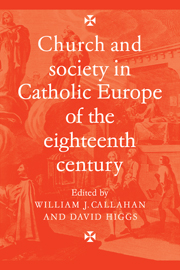Book contents
- Frontmatter
- Contents
- Preface
- Notes on contributors
- 1 Introduction
- 2 The French church
- 3 The Spanish church
- 4 The Portuguese church
- 5 The Italian churches
- 6 The German Reichskirche
- 7 The Austrian church
- 8 The Hungarian church
- 9 The Polish church
- 10 Popular religion in the eighteenth century
- Select bibliography
- Index
6 - The German Reichskirche
Published online by Cambridge University Press: 05 November 2011
- Frontmatter
- Contents
- Preface
- Notes on contributors
- 1 Introduction
- 2 The French church
- 3 The Spanish church
- 4 The Portuguese church
- 5 The Italian churches
- 6 The German Reichskirche
- 7 The Austrian church
- 8 The Hungarian church
- 9 The Polish church
- 10 Popular religion in the eighteenth century
- Select bibliography
- Index
Summary
The Reformation and Counter-Reformation divided Germany and produced two major civil wars which ended only after extensive involvement by foreign powers. At the same time, the century between 1540 and 1640 produced solutions in federal public law which guaranteed the internal religious uniformity of each of the approximately 300 territorial states, while establishing heterodoxy at the federal or Reich level. After the Peace of Westphalia attempts were made to remove religion from federal politics by forming two blocs of territories in the Reichstag or imperial assembly – the corpus catholicorum and the corpus evangelicorum. In practice, the right of territories to ‘split into parts’ at the federal political level was used sparingly, and then only by the Protestants, especially around 1700, an indication that they were the weaker party. In the mid eighteenth century Christian August Beck, tutor in public law to the future Emperor Joseph II, admitted:
This so-called ‘splitting into parts’ is indeed granted in the appropriate place in the Westphalian Peace and is recognised as the pinnacle of their freedom by the Protestants, but in practice it leads to very damaging consequences, and in view of the absence of an amicable understanding, the whole matter is left to its own devices, in order that any hint of extolling the virtues of something similar to the ‘free vote’ as in Poland can be suppressed.
Beck was aware of the threat that religious dissent still posed to peaceful cooperation within federal Germany.
- Type
- Chapter
- Information
- Publisher: Cambridge University PressPrint publication year: 1979
- 2
- Cited by

